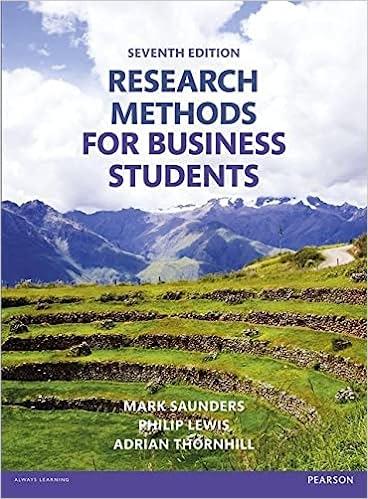Carla, a masters student in her last year, just came back from her semester abroad in China.
Question:
Carla, a master’s student in her last year, just came back from her semester abroad in China. She was very impressed by the Chinese culture. Furthermore Carla felt that China would become more and more important within the next years, due to Chinese multinationals’ increased globalisation efforts. During an internship at a British–Chinese joint venture company in Shanghai, Carla had learned first-hand that intercultural collaboration was very difficult and that distrust infected many collaborations. She also felt that the Chinese understanding of trustworthiness was quite different when compared to the British, and that it would be useful to her intended future career in international marketing if she were able to gain a better understanding of the Chinese.
For her master’s research project, Carla therefore decided that she wanted to investigate Chinese students’ interpretation of trust.
To collect her data she decided to use Muethel’s (2015) board game method. This initially presents participants with a series of different values related to trust, each recorded on a prism. Participants are then asked to rank the values in order of importance on the game board, and to explain the meaning of each value recorded on the prism. Carla would record each participant’s answers to her questions about each value’s meaning on her smart phone and transcribe them subsequently.
Carla knew several Chinese students at her university and was sure that they would participate in her project. She prepared a participant information sheet and consent form and, at the same time, emailed them to see if they would be willing to participate. Luckily, 15 of Carla’s Chinese friends agreed to be interviewed for her master’s research project. The first 10 interviews with Chinese students indicated a clear rank order of values, with honesty in the first place.
During the 11th interview with a Chinese student named Lian, Carla asked Lian to rank the values (related to trust) in order of importance. Lian started to do so. As he did this he explained that, from his point of view, the value ‘honesty’ was quite irrelevant for trust.
Consequently he had decided to rank it last. However, just a second before placing honesty on the last rank on the board, he looked at Carla, and saw that she was frowning. He hesitated, and asked her ‘Is that the right rank order? If you want to, I can also change the order’.
Carla instinctively replied that the previous students all chose honesty to be the most important value. Lian agreed, saying ‘Makes sense to me . . .’ and then changed the rank order. After the interview, she reflected on the incident. Should she have reacted differently?
During the next week, Carla undertook the remaining interviews, having decided not to react to any responses to questions at all.
In the complete set of 15 interviews, 13 Chinese students had ranked honesty in first place.
Two students (in addition to Lian), however, felt that honesty was completely irrelevant for trust and had ranked it last.
Questions 1 Imagine you are undertaking Carla’s research as outlined above. Look at your university’s guidance on ethical approval and draft the participant information sheet and consent form you would use.
2 Should Carla have answered Lian’s question?
3 Is there anything Carla should consider with regard to the interview data from Lian?
4 How should Carla treat the two deviant answers?
Step by Step Answer:

Research Methods For Business Students
ISBN: 9781292016627
7th Edition
Authors: Mark N.K. Saunders, Philip Lewis, Adrian Thornhill





